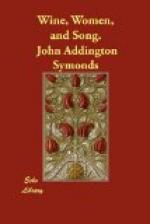A third point worthy of attention is, that a certain breath of paganism, wafting perfumes from the old mythology, whispering of gods in exile, encouraging men to accept their life on earth with genial enjoyment, was never wholly absent during the darkest periods of the Middle Ages. This inspiration uttered itself in Latin; for we have little reason to believe that the modern languages had yet attained plasticity enough for the expression of that specific note which belongs to the Renaissance—the note of humanity conscious of its Graeco-Roman pagan past. This Latin, meanwhile, which it employed was fabricated by the Church and used by men of learning.
VII.
The songs of the Wandering Students were in a strict sense moduli as distinguished from versus; popular and not scholastic. They were, however, composed by men of culture, imbued with classical learning of some sort, and prepared by scholarship for the deftest and most delicate manipulation of the Latin language.
Who were these Wandering Students, so often mentioned, and of whom nothing has been as yet related? As their name implies, they were men, and for the most part young men, travelling from university to university in search of knowledge. Far from their homes, without responsibilities, light of purse and light of heart, careless and pleasure-seeking, they ran a free, disreputable course, frequenting taverns at least as much as lecture-rooms, more capable of pronouncing judgment upon wine or women than upon a problem of divinity or logic. The conditions of medieval learning made it necessary to study different sciences in different parts of Europe; and a fixed habit of unrest, which seems to have pervaded society after the period of the Crusades, encouraged vagabondage in all classes. The extent to which travelling was carried in the Middle Ages for purposes of pilgrimage and commerce, out of pure curiosity or love of knowledge, for the bettering of trade in handicrafts or for self-improvement in the sciences, has only of late years been estimated at a just calculation. “The scholars,” wrote a monk of Froidmont in the twelfth century, “are wont to roam around the world and visit all its cities, till much learning makes them mad; for in Paris they seek liberal arts, in Orleans authors, at Salerno gallipots, at Toledo demons, and in no place decent manners.”
These pilgrims to the shrines of knowledge formed a class apart. They were distinguished from the secular and religious clergy, inasmuch as they had taken no orders, or only minor orders, held no benefice or cure, and had entered into no conventual community. They were still more sharply distinguished from the laity, whom they scorned as brutes, and with whom they seem to have lived on terms of mutual hostility. One of these vagabond gownsmen would scarcely condescend to drink with a townsman:[6]—
“In
aeterno igni
Cruciantur rustici, qui non
sunt tam digni
Quod bibisse noverint bonum
vinum vini.”




